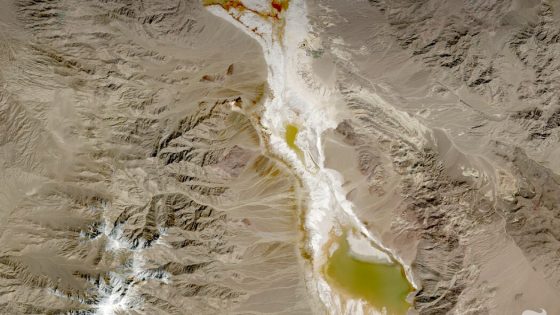Over the course of three days last week, winds in Death Valley in California were strong enough to move a temporary lake, known informally as Lake Manly, two miles north, the National Park Service said this week.
“The lake went for a walkabout,” Abby Wines, a park ranger at Death Valley National Park, said in an interview on Thursday.
The powerful winds were part of a storm system out of the Pacific Northwest that moved across portions of California and Nevada, Brian Planz, a meteorologist with the National Weather Service office in Las Vegas, said on Thursday.
In Death Valley, the winds started to pick up in the afternoon on Feb. 29, and they consistently blew between 20 and 33 miles per hour on March 1 and 2, according to weather data from the National Park Service. At times on March 1 and 2, the winds reached speeds of 40 to 50 m.p.h., peaking at 54.8 m.p.h. at 10 a.m. on March 2, according to the Park Service.
Strong winds on Saturday reached 88 m.p.h. at Angel Peak, in the Spring Mountains northwest of Las Vegas, and up to 69 m.p.h. at Harry Reid International Airport in Las Vegas, according to the National Weather Service. Mr. Planz said his office received reports from around the area of minor damage to trees, power lines, utility poles and buildings.
Ms. Wines described the winds as “strong enough to knock you off balance.”
They were also strong enough, it turns out, to move Lake Manly, an ephemeral and shallow body of water that forms when enough rain falls in the saltwater flats of Badwater Basin. When the lake appears, people flock there with canoes and kayaks.
As the winds began on Thursday afternoon, Ms. Wines said she went out to Lake Manly and saw “little waves” moving. She returned on Saturday to find that the lake had moved.
“I definitely was impressed by the fact that an area where a couple days before I was able to launch a kayak from 10 feet off the road was now just a salt flat as far as I could see,” she said.
Mr. Planz said that it was not uncommon for strong winds to move bodies of water, noting similar episodes over the years near Lake Erie and Galveston Bay in Texas. He said he was not surprised to learn that Lake Manly had moved because it is shallow and not a normal lake.
“It’s peculiar the lake is there at all and then for it to just decide to up and move two miles,” Ms. Wines said.
Lake Manly formed most recently with rain from Tropical Storm Hilary in August. Rain in Death Valley in early February made Lake Manly six miles long, three miles wide and one foot deep, according to the Park Service. The last time Lake Manly swelled to “significant depth” before it reappeared last year was in 2005, Jennette Jurado, a National Park Service spokeswoman, said.
“It’s very shallow,” Mr. Planz said. “So it’s easy for the wind to move it.”
After Lake Manly moved, the Park Service announced that boating would not be allowed on the lake until it refills.
“It was amazing to see an entire lake migrate,” Mike Reynolds, superintendent of Death Valley National Park, said in a statement on Monday. “But now the water is drying up, leaving wide mud flats. People were walking a long way, sometimes dragging their boats. This leaves footprints and drag marks that will likely be visible for years. This left us with no choice but to curtail boating on historic Lake Manly at this time.”
By Thursday, the water from Lake Manly had drifted back to its original location, Ms. Wines said, adding that the water was brown “because it got stirred up.”
“That’s slowly settling out,” Ms. Wines said. “It should get back to its blue color with good reflections at some point.”
Source Agencies



